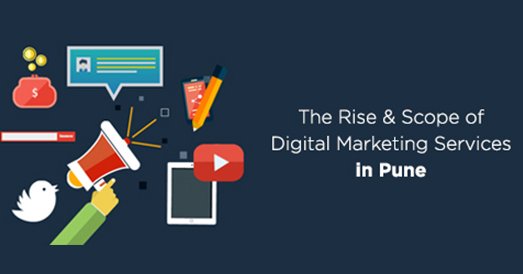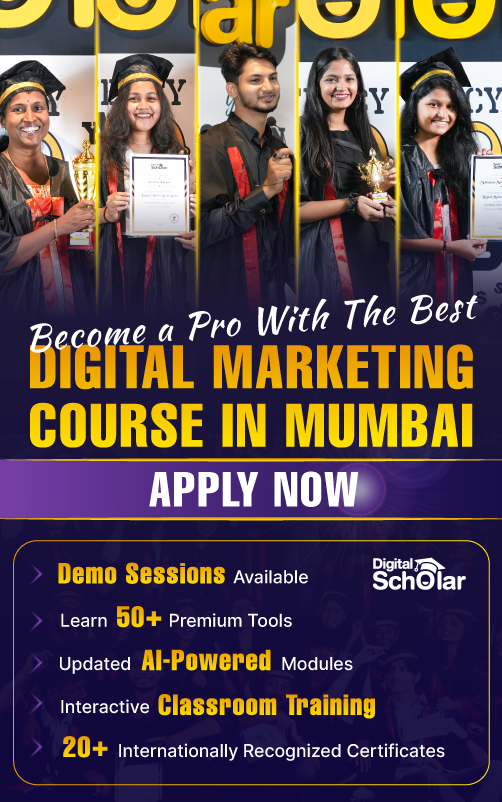Why Choose a Job-Oriented Digital Marketing Course?
Category : Blog
Written by Mischa McInerney

Introduction
Digital marketing has revolutionized the way businesses operate and reach their customers. In today’s fast-paced, tech-driven world, the ability to navigate the digital landscape is not just a valuable skill—it’s essential. If you’re looking to kickstart a career that’s both dynamic and in high demand, a job-oriented digital marketing course is your ticket to success.
- Introduction
- What is Digital Marketing?
- Importance of Digital Marketing Skills in Today’s Job Market
- Why Choose a Job-Oriented Digital Marketing Course?
- Benefits of a Job-Oriented Approach
- High Demand for Digital Marketing Professionals
- Key Components of a High-Converting Digital Marketing Course
- Comprehensive Curriculum
- Hands-On Projects
- Industry-Recognized Certifications
- Career Support Services
- Detailed Breakdown of Course Modules
- Module 1: Digital Marketing Fundamentals
- Overview of Digital Marketing
- Key Concepts and Terminology
- Module 2: Search Engine Optimization (SEO)
- On-Page SEO
- Off-Page SEO
- Technical SEO
- Module 3: Content Marketing
- Content Strategy
- Creating Engaging Content
- Content Distribution Channels
- Module 4: Social Media Marketing
- Social Media Platforms Overview
- Developing Social Media Strategies
- Social Media Advertising
- Module 5: Pay-Per-Click Advertising (PPC)
- Introduction to PPC
- Google Ads
- Facebook Ads
- Module 6: Email Marketing
- Email Marketing Strategies
- Building Email Lists
- Automation and Personalization
- Module 7: Web Analytics
- Introduction to Web Analytics
- Google Analytics
- Analyzing and Interpreting Data
- Module 1: Digital Marketing Fundamentals
- What to Look for in a Digital Marketing Course Provider
- Accreditation and Recognition
- Experienced Instructors
- Positive Student Reviews
- Success Stories and Testimonials
- Real-life Examples of Successful Graduates
- Testimonials from Course Participants
- How to Get Started
- Enrolling in a Course
- Preparing for the Course
- Tips for Success
- Conclusion
- Recap of the Benefits of a Digital Marketing Course
- Final Encouragement to Pursue a Career in Digital Marketing
- FAQs
- What qualifications do I need to enroll in a digital marketing course?
- How long does it take to complete a digital marketing course?
- Are there any prerequisites for this course?
- What kind of jobs can I get after completing the course?
- Is there any financial aid available for digital marketing courses?

Benefits of a Job-Oriented Approach
Opting for a job-oriented digital marketing course means you’re not just learning theories; you’re acquiring skills that can be immediately applied in the workplace. These courses are designed to align with industry needs, ensuring you’re equipped to meet the demands of potential employers from day one.

High Demand for Digital Marketing Professionals
Businesses of all sizes are on the lookout for skilled digital marketers who can help them stand out in the crowded online marketplace. With a job-oriented digital marketing course, you can position yourself as an attractive candidate in a field that’s continually growing and evolving.

Key Components of a High-Converting Digital Marketing Course
Comprehensive Curriculum
A robust curriculum covers all aspects of digital marketing, from SEO and content marketing to social media and PPC advertising. This holistic approach ensures you have a well-rounded understanding of the digital marketing ecosystem.

Hands-On Projects
Practical experience is crucial. The best courses include hands-on projects that allow you to apply what you’ve learned in real-world scenarios. This not only solidifies your knowledge but also builds a portfolio to showcase to future employers.

Industry-Recognized Certifications
Certifications from reputable organizations validate your skills and knowledge. They serve as a testament to your expertise, making you a more appealing candidate to potential employers.

Career Support Services
Top-tier courses offer career support services such as resume building, interview preparation, and job placement assistance. These services are invaluable in helping you transition from student to professional.

Detailed Breakdown of Course Modules
Module 1: Digital Marketing Fundamentals
Overview of Digital Marketing
This module sets the stage by introducing you to the world of digital marketing, covering its history, evolution, and significance in the modern business landscape.
Key Concepts and Terminology
Learn the essential terms and concepts that form the foundation of digital marketing, such as SEO, PPC, conversion rates, and more.
Module 2: Search Engine Optimization (SEO)
On-Page SEO
Discover how to optimize individual web pages to rank higher and earn more relevant traffic from search engines. This includes optimizing content, meta tags, and URL structures.
Off-Page SEO
Learn about the importance of backlinks, social signals, and other external factors that influence your site’s authority and ranking.
Technical SEO
Dive into the technical aspects of SEO, such as site speed, mobile optimization, and crawlability, to ensure search engines can easily index and rank your site.
Module 3: Content Marketing
Content Strategy
Develop a content strategy that aligns with your business goals and resonates with your target audience.
Creating Engaging Content
Master the art of creating compelling content that captures attention and drives engagement, from blog posts and infographics to videos and podcasts.
Content Distribution Channels
Explore various channels for distributing your content, including social media, email, and content syndication platforms.
Module 4: Social Media Marketing
Social Media Platforms Overview
Get acquainted with major social media platforms like Facebook, Instagram, Twitter, LinkedIn, and TikTok, and understand their unique features and audiences.
Developing Social Media Strategies
Learn how to create effective social media strategies that build brand awareness, drive traffic, and generate leads.
Social Media Advertising
Unlock the potential of paid social media advertising, including campaign setup, targeting options, and performance tracking.
Module 5: Pay-Per-Click Advertising (PPC)
Introduction to PPC
Understand the basics of PPC advertising, including how it works and why it’s an essential component of a digital marketing strategy.
Google Ads
Dive deep into Google Ads, learning how to create, manage, and optimize campaigns to maximize ROI.
Facebook Ads
Explore the world of Facebook advertising, from setting up campaigns to targeting specific audiences and measuring success.
Module 6: Email Marketing
Email Marketing Strategies
Develop strategies for effective email marketing campaigns that nurture leads and drive conversions.
Building Email Lists
Learn techniques for growing your email list with engaged subscribers.
Automation and Personalization
Harness the power of email automation and personalization to deliver relevant, timely messages to your audience.
Module 7: Web Analytics
Introduction to Web Analytics
Understand the importance of web analytics in measuring the effectiveness of your digital marketing efforts.
Google Analytics
Gain proficiency in Google Analytics, learning how to track, analyze, and interpret data to make informed marketing decisions.
Analyzing and Interpreting Data
Learn how to analyze data and generate actionable insights that drive continuous improvement in your marketing campaigns.
What to Look for in a Digital Marketing Course Provider
Accreditation and Recognition
Ensure the course provider is accredited and recognized by industry bodies. This guarantees the quality and relevance of the education you’re receiving.
Experienced Instructors
Look for courses taught by experienced professionals who bring real-world insights and practical knowledge to the classroom.
Positive Student Reviews
Research reviews and testimonials from past students to gauge the effectiveness and quality of the course.
Success Stories and Testimonials
Real-life Examples of Successful Graduates
Reading about the experiences of graduates who have successfully transitioned into digital marketing roles can provide inspiration and insight into the potential career paths available.
Testimonials from Course Participants
Positive feedback from previous students can reassure you of the course’s value and effectiveness.
How to Get Started
Enrolling in a Course
Once you’ve chosen the right course, the enrollment process is usually straightforward. Follow the instructions on the course provider’s website to secure your spot.
Preparing for the Course
Prepare by familiarizing yourself with the basics of digital marketing. This could involve reading introductory materials or completing pre-course assignments.
Tips for Success
Stay organized, participate actively in discussions, complete all assignments on time, and take advantage of networking opportunities with peers and instructors.
Conclusion
In conclusion, a job-oriented digital marketing course is an excellent investment in your future. It equips you with the skills and knowledge needed to thrive in a rapidly evolving industry. By choosing a comprehensive, hands-on course with strong career support, you set yourself up for success in the digital marketing world.
FAQs
What qualifications do I need to enroll in a digital marketing course?
Most digital marketing courses do not require specific qualifications, but having a basic understanding of marketing principles can be helpful.
How long does it take to complete a digital marketing course?
Course durations vary, typically ranging from a few weeks to several months, depending on the depth and intensity of the curriculum.
Are there any prerequisites for this course?
Generally, there are no strict prerequisites, but familiarity with basic computer skills and the internet is essential.











